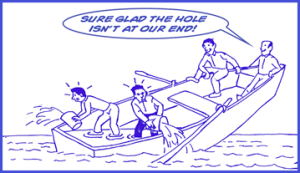Self-Defense Instructor Problem: How do I deal with a person’s whose argument is that violent assault is a societal, not an individual problem, and therefore, it is not an individual’s responsibility to prevent his or her own victimization?
As a self-defense instructor or proponent, many times you will be faced with someone who states that “it is not his or her job to prevent being assaulted. It is society’s job.”
Handing this situation requires the following:
#1. Understand that this person is expressing his or her viewpoint, not a fact. This viewpoint arises from a Belief System. Let’s call it Belief System A.
#2. Belief System A can be described by these premises and conclusion:
- a) Violent assault is a systemic societal problem.
- b) Since violent assault is a societal problem, it is society’s responsibility to solve it.
- c) Since violent assault is a societal, not an individual problem, it is not an individual’s responsibility to prevent his or her own victimization.
- d) Society needs to protect individuals from violent assault.
- e) Therefore, individuals should not have to engage in self-defense practices.
#3. Belief System A is very persuasive since there is a reasonable possibility that you agree with premises a, b, c, d. Conclusion (e) on the other hand is NOT the only conclusion that can be reached from premises a, b, c, d.
For example, Belief System B follows:
- a) Violent assault is a systemic societal problem.
- b) Since violent assault is a societal problem, it is society’s responsibility to solve it.
- c) Since violent assault is a societal, not an individual problem, it is not only an individual’s responsibility to prevent his or her own victimization.
- d) Society needs to protect individuals from violent assault.
- e) Violent assault is a societal problem that impacts individuals making it in an individual’s best interest to not be victimized. Therefore, individuals should engage in self-defense practices and training.
#4. Understand that the conclusion of Belief System A is predicated on the opinion/belief that a person shouldn’t have to engage in a certain activity because it is not his or her responsibility to do so. And I agree, he or she shouldn’t have to because of responsibility. But not having the responsibility to do something, does not exclude the FACT that a person may benefit from doing something.
It is an undeniable fact that a person benefits from NOT being violently assaulted. Responsibility and benefit are not tied together. You can benefit from doing something that you are not responsible for doing. Belief System A draws the incorrect conclusion that not being responsible means there is no benefit.
Belief System B on the other hand, doesn’t deny Belief System A. Belief System B concludes that you engage in Self-defense practices and training NOT because of RESPONSIBILITY, but because of BENEFIT.
#5. Let’s look how this logic is applied in real life.
Self-defense Instructor: I think it is important for people to learn self-defense.
SD Opposer: It is not my job to prevent being assaulted. It is society’s job.
Self-defense Instructor: Yes, it is society’s responsibility to prevent you from being assaulted. But you benefit the most from not being assaulted.
SD Opposer: I shouldn’t have to learn and use self-defense strategies. People shouldn’t assault me.
Self-defense Instructor: Yes, you shouldn’t have to learn and use self-defense strategies, and people shouldn’t assault you. But it is in your best interest to do so.
SD Opposer: I have the right to do/go/wear/say/etc. whatever I want and not be assaulted.
Self-defense Instructor: Yes, you have the right to do/go/wear/say/etc. whatever you want (assuming it is legal) and not be assaulted. But, you benefit greatly from not being assaulted.
End scenario
—————————————–
Conclusion:
The concept of responsibility is a societal construct. “Proving” responsibility is a flawed process. The legal system is an example of the difficulty of “proving” and assigning responsibility. Trying to show that it is someone responsibility to prevent their own assault is an impossible task.
Demonstrating that it is in a person’s best interest to not be assaulted is relatively simple.
